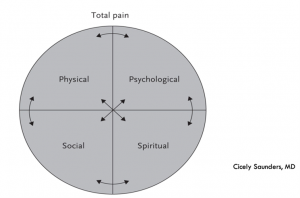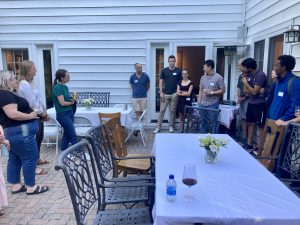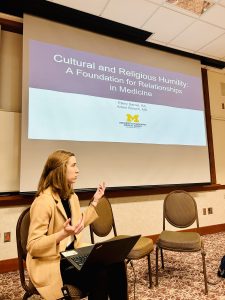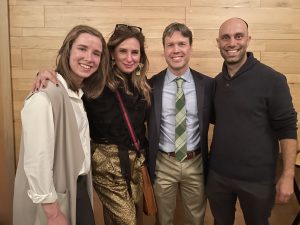Out of the countless PowerPoint slides from M1 year, there’s one that, four years later, I can still picture with absolute clarity. Presented in coordination with the University of Michigan Medical School’s Program on Health, Spirituality and Religion (HSR), the slide was part of a lecture on attending to the religious and/or spiritual identities of our patients, and it portrayed the Theory of Total Pain. Proposed by the founder of modern hospice, Dr. Cicely Saunders MD, this theory describes suffering as the sum of a patient’s physical, psychological, social, and spiritual distress. This slide and its message has stuck with me as, over the course of medical school, I have seen Dr. Saunders’ multidimensional view of health and suffering come to life in the stories of my patients.

Figure 1: Dr. Cicely Saunders’ Theory of Total Pain
As clinical students, we have the privilege of accompanying people during some of their most joyous and some of their most challenging moments. These patient relationships range from witnessing someone deliver their newborn baby to walking alongside someone mourning the reality that they are dying. While at vastly different ends of the emotional continuum, a common thread connects these two relationships. Both prompt a sense of wonder about how patients and their loved ones navigate such significant moments of transition. It’s in these moments where it becomes particularly clear to me that the practice of good medicine demands both provision of excellent biomedical care as well as a willingness to connect, person to person, with the human sitting in front of me.

Our HSR Welcome Dinner, a time for medical students and HSR core faculty members to connect, reflect, and eat good food!
Within this connection, patients consistently teach me about Dr. Saunders’ theory of medicine in conveying that health is not solely biological or physical, but together with other essential dimensions of health and personhood – health is also psychological, emotional, social, and spiritual. Their instruction to me of these dimensions comes in many forms: a request to keep family informed about clinical updates, an inquiry about Halal food options in the cafeteria, a desire to spend time outside in the midst of a long hospital admission. It is these lessons about the multidimensional nature of health and suffering that have led me to dive into all that the HSR Program has to offer.
The HSR Program was created in 2017 with the mission of developing opportunities for medical trainees and physicians to explore the intersections between health, spirituality, and religion. Broadly speaking, spirituality is anchored in where an individual finds meaning, whether that be in a world religion, nature, family, music, etc. Our exploration of this intersection occurs through lectures, research, and interdisciplinary training and is all geared towards enhancing patient centered care and encouraging personal meaning making in the practice of medicine. With this mission in mind, we host a speaker series, create courses/curricula on health, spirituality and religion and mentor students on how their religious and/or spiritual identity contributes to their professional identity formation. This innovative program is led by an incredibly kind and thoughtful group of attending physicians, Drs. Kristin Collier (Internal Medicine), Jeremy Baruch (Psychiatry), Adam Baruch (Ob/Gyn), and Phil Choi (Pulmonary & Critical Care).
To expand further upon opportunities for engagement with the HSR Program, I want to share some of my highlights from my involvement. Our monthly Woll Family Speaker Series on Health, Spirituality and Religion (an opportunity that is open to all who are interested!) brings in speakers who share how the intersections between HSR are apparent in their own experiences with patients. We’ve heard lectures from physicians affiliated with the University of Michigan, including our own Dr. Scott Stonington, an Internal Medicine physician and anthropologist, who presented a talk entitled “Working the Mind-Body: Discomfort and the Pragmatics of Spirituality (in Thailand and the U.S.).” We also bring in speakers from other institutions. Recently, we hosted Dr. Rita Charon, an Internal Medicine physician at Columbia University and literary scholar credited with creating the field of Narrative Medicine, who led an interactive discussion entitled, “Native Fusion: Creativity, Responsibility, Meaning,”. These seminars have led to rich discussions about the nature of suffering and what it means to be healthy, all the while building up a sense of community among students, faculty, staff, and members of the Ann Arbor area who are interested in engaging with such questions of humanity and healthcare in all its fullness.
In addition to the seminar series, all medical students rotating through an intensive care unit (ICU) have the opportunity to participate in the HSR Program’s Healing Presence elective, which I participated in during my Pediatric ICU rotation. The ICU directors love Healing Presence and encourage all medical students to partake. For participating students, you have the opportunity to develop new patient care skills focused on the spiritual needs of your patients. This development occurs through rounding with chaplains in the ICU during which you have the chance to explore various skills such as taking a spiritual history, providing supportive listening, and sharing healing words/prayer. You also engage in a structured, small group facilitated by a chaplain to process your own experience working with critically ill patients and their families. Personally, the Healing Presence elective helped promote my wellbeing while on an intense rotation and has helped me feel more equipped to attend to the spiritual distress of my patients and to work effectively with Spiritual Care colleagues.

Presenting the Conference on Medicine and Religion workshop that Dr. Baruch and I created.
At the core of my experience with the HSR program has been the longitudinal mentorship I received. What started with a “cold email” sent near the beginning of M1 year has turned into what I hope will be lifelong mentoring relationships with Drs. Kristin Collier and Adam Baruch. Through their mentorship, I have grown personally and professionally and added depth of meaning to my understanding of the practice of medicine. They have opened the door to unique opportunities for scholarship. I’ve contributed to curriculum development, specifically working alongside attending physicians and other medical students to evolve in the Doctoring session on “Religion and Spirituality in Patient-Centered Care.” In coordination with Dr. Collier, I’ve co-presented a talk entitled, “Whole Person Care” at a Continuing Medical Education event hosted by Michigan Medicine. I’ve collaborated with Dr. Baruch in conducting an Ob/Gyn Grand Rounds presentation and a Conference on Medicine and Religion workshop, both of which were entitled, “Cultural and Religious Humility: A Foundation for Relationships in Medicine.” With the help of another medical student, we’ve subsequently turned these presentations into a manuscript that is pending submission.
These mentoring relationships and my engagement with the HSR Program has culminated in being the inaugural student fellow for the program during the 2022-23 academic year. Within this role, I’ve had the privilege of helping develop our programming through participating in regular HSR core faculty meetings, helping select speakers for the Woll Family speaker series, providing near-peer mentoring of a clinical trunk student, and cultivating a community among students interested in what the HSR Program has to offer. Having wrapped up medical school, I’m thrilled to know that three, all-star medical students will step into the role of HSR student fellow for this upcoming academic year. I can’t wait to see how they help shape the HSR Program and community!
While I’m immensely proud of our scholarly work, what is most significant to me is the way I anticipate this work finding expression in my practice of medicine. As I look ahead to July and the start of my OBGYN residency at the University of Michigan (Go Blue!), I’m confident that my involvement in the HSR Program will continue to come to life in the patients I help care for and in the ways they will take up Dr. Saunders’ torch in teaching me about health and suffering as the sum of their physical, psychological, social, and spiritual states. And more personally, I’m grateful for the ways that my role as an interested student, mentee and fellow continue to help me feel more deeply connected to sources of meaning in medicine, a gift that feels particularly significant amidst the crisis of physician burnout.

A fun dinner outing with core faculty for the HSR Program!
The HSR Program has so much to offer the intrigued Michigan medical student. Opportunities abound both for dabbling in our programming and for more in-depth exploration. You can find these opportunities summarized on our website, and while you should absolutely explore this webpage, I would be remiss if I didn’t encourage you to reach out to talk with us! At the core of this Program’s mission is its commitment to personal connection with students who have never had the opportunity to explore this space or who wish to dive deeper into this space of whole person care. If you find yourself interested, please reach out! You can connect with me at sarosie@med.umich.edu or message our HSR Program email at Health.Spirituality.and.Religion.Info@umich.edu. Whether you’re a current or prospective medical student, we would love to hear from you!
Don’t miss the next Dose of Reality.
Ellery Sarosi is a 2023 graduate of the University of Michigan Medical School. During her fourth-year of medical school, Ellery served as the inaugural student fellow for the medical school’s Program on Health, Spirituality, and Religion. She will be continuing her training at the University of Michigan as an OBGYN resident.
